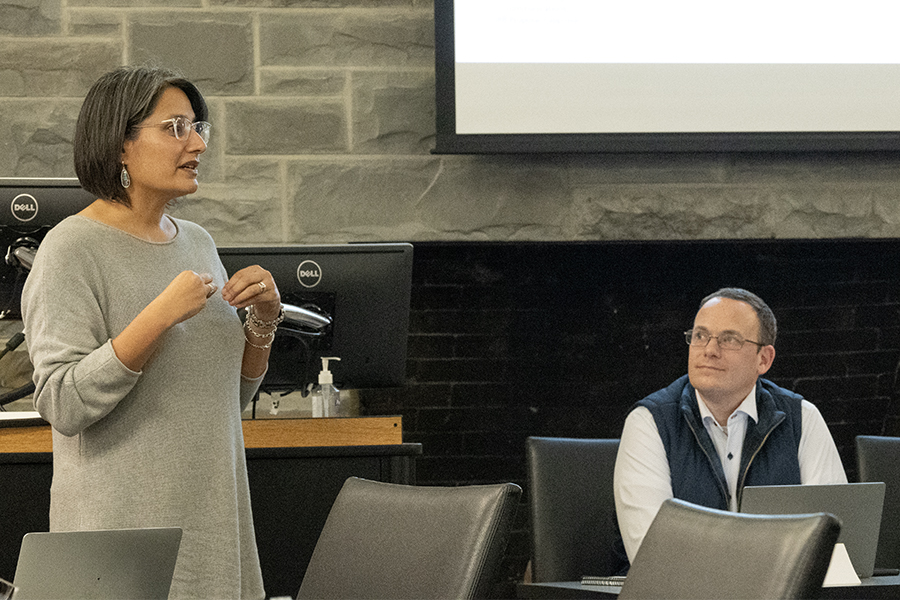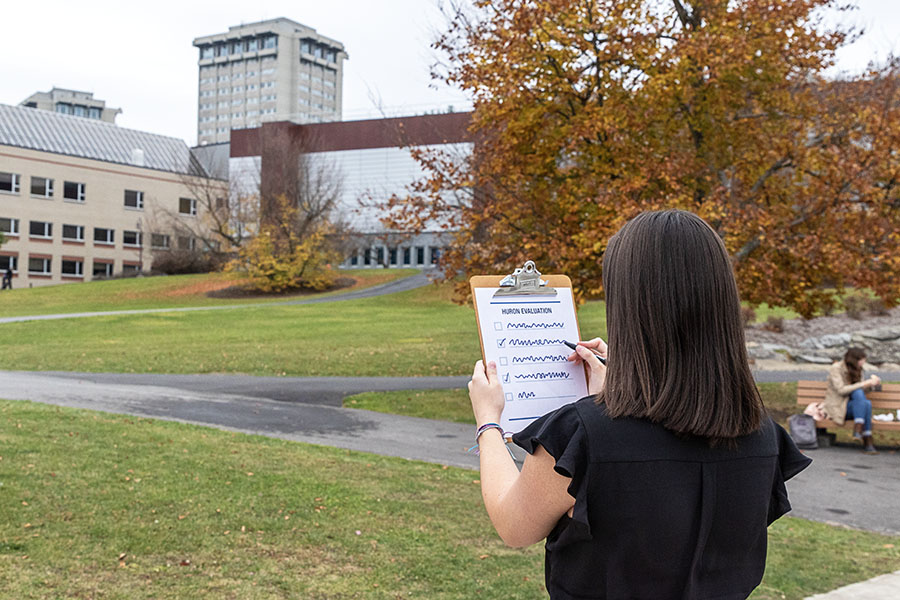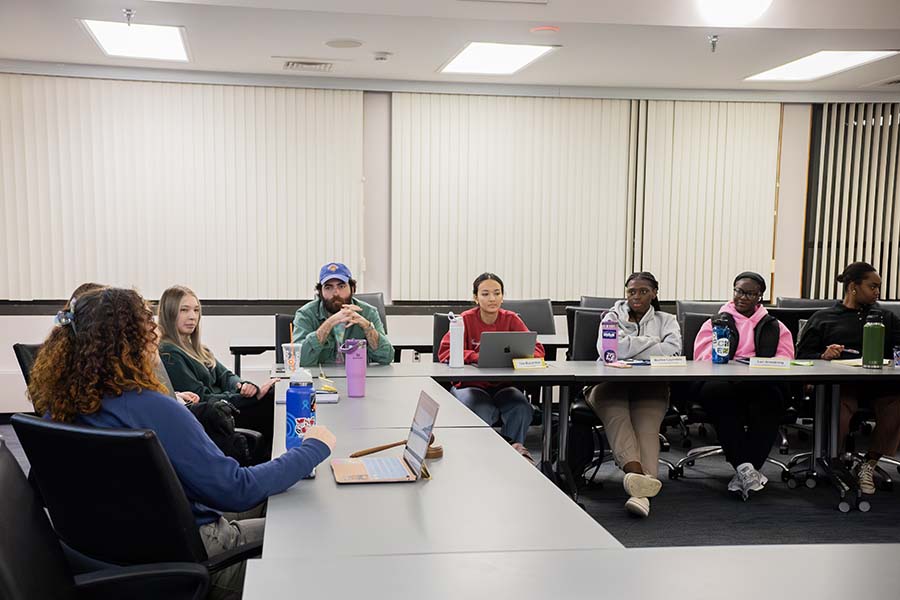Ithaca College’s Faculty Council met for its monthly meeting Nov. 7 to discuss low response rates to the Campus Climate Survey that closes Nov. 14 and to hear from the Faculty and Staff Wellness Committee about benefits enrollment.
Campus Climate Survey and Provost’s Report
Belisa Gonzalez, professor of sociology and dean of faculty, equity, inclusion, and belonging, is one of the co-chairs of the Campus Climate Survey Working Committee. Gonzalez said the current response rate is about 15%, which is much less than the Campus Climate Survey working committee is looking for. Gonzalez was also one of the co-chairs the last time the survey was held in 2016, when the response rate was 46%.
Gonzalez said some survey respondents raised concerns about anonymity and confidentiality.
“A number of people who have multiple targeted identities [have raised concerns about being identified] … which I think is a super valid concern, one that I would have as well,” Gonzalez said.
Gonzalez said the raw data collected from the survey is not seen by anyone except Rankin Climate — a company that assesses institutional climate and specifically works with the college’s working committee — who do not report on this.
“[Rankin] will not report on any combination of variables that has less than five variables in it,” Gonzalez said. “It won’t be disaggregated in a way that you would be able to tell who said what.”
Rankin will be involved in the post-data collection stage of the survey. Gonzalez said representatives from the company will visit campus to give presentations to specific campus constituencies.
Gonzalez asked council members to consider dedicating class time to encourage students to complete the survey, to which David Hajjar, assistant professor in the Department of Speech-Language Pathology and Audiology, asked about the average completion time for students. Gonzalez said students typically take between 10 to 15 minutes to complete the survey.
Benefits enrollment
Members from the Faculty and Staff Benefits Committee discussed benefits enrollment with the council. Chris Hummel, clinical professor and chair of the Department of Exercise Science and Athletic Training, and Elizabeth Mendez, senior director of benefits administration, represented the committee.
Hummel reminded the council that the deadline for open enrollment for benefits is 5 p.m. Nov. 10 and encouraged members to reach out to the benefits committee when they have concerns.
The open enrollment period allows faculty and staff to make changes to their individual choices for 2024. The college’s current medical provider is Aetna.
The college offers two types of plans to its employees: the High Deductible Health Plan (HDHP) and the Point of Service II Plan (POS II). The main difference between these two plans is the deductible amount. The deductible is the set amount of money an individual has to pay out of their own pocket before their insurance company starts covering the costs.
Copay accumulators, like the one PrudentRX has, make it so third-party assistance does not count toward the patient’s deductible or maximum out-of-pocket expenses. In the PrudentRX plan, this is called “coupon maximizers” and has the same effect.
While the college was going to implement the PrudentRX copay assistance program for the HDHP in 2024, Mendez said the program would not be implemented because of concerns brought forth by employees.
“We came to the conclusion that, in essence, it’s going to work differently from an operational perspective for the high deductible health plan,” Mendez said.
School updates
David Gondek, associate professor in the Department of Biology and chair of the Faculty Council, started the meeting by announcing that Music Librarian Kristina Shanton and Carly Jo Hosbach-Cannon, associate director and graduate program chair of the Department of Speech-Language Pathology and Audiology, will be serving as parliamentarians. The primary role of the parliamentarian would be to assist the chair in running meetings smoothly.
“Part of being parliamentarian is bringing impartiality to the discussion,” Gondek said. “We think by tag teaming, they can remain impartial.”
Representatives from all five schools and the Ithaca College Library gave updates. Hajjar said his department is starting an online Master of Science in Speech-Language Pathology program. Hajjar said the first intake for the program will be in Fall 2024 and the department is currently working on developing coursework.
“This has been approved through all the various certifications for speech-language pathology,” Hajjar said.
Shanton said the library now houses the Writing Center — which is typically located in Smiddy Hall — from 7 p.m. to 10 p.m. from Sunday to Thursday every week. The library now also offers a 24/7 live chat service to faculty and students and is also loaning out light therapy boxes that artificially simulate natural sunlight to the campus community for six hours at a time.
Melanie Stein, provost and senior vice president of academic affairs, said as a part of her report that there are no significant updates to the search for the dean of the School of Health Sciences and Human Performance. She said the council can expect to hear more about the process in February during finalist interviews. Stein added that she was impressed by the success of alumni weekend that took place Oct. 27 to 29.
“Alumni weekend was elevated because we had a rich set of programming that was supplemented by the 50th anniversary [of the School of Communications],” Stein said. “All together [it was] a great weekend.”
Grievance Policies
Brendan Murday, associate provost of faculty affairs, provost and academic affairs, visited the council to facilitate grievance policy discussions. Upon discussion, the council decided to make a friendly amendment to add five business days to the receipt of the preliminary report from the fact-finding committee, after which the committee will make a determination and prepare the final report, including the determination.
After discussing grievance policies, the council went into executive session with Stein to discuss formal faculty review procedures.














